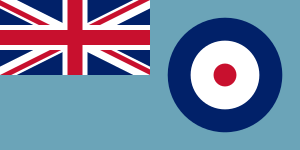No. 81 Group RAF
No. 81 (Training) Group was a group within the Royal Air Force's Fighter Command during the Second World War and the post-war era.[1][2]
| No. 81 Group | |
|---|---|
| Active | 1940 - 1943 1952 - 1958 |
| Country | |
| Branch | |
| Motto(s) | Fulmina Ex Igne Politiora |
History
The group was formed on 16 December 1940 at RAF Sealand as part of Fighter Command to control the Operational Training Unit.[2] On 19 February 1941 it moved to Tallow Hall in Worcester and then on 22 December 1941 it was based at Avening Court in Gloucestershire.[2] It was disbanded on 15 April 1943 when all controlled units were moved to No. 9 Group.[2]
The group was reformed on 1 Jan 1952 at RAF Watnall to control all training units within Fighter Command, on 16 May 1952 it moved to RAF Rudloe Manor.[2] It was finally disbanded on 31 Mar 1958.[2]
Organisation in 1942
In July 1942, the group was organised as follows;[3]
- Group Headquarters, RAF Avening Court, Gloucestershire
- No.51 Operational Training Unit RAF, RAF Cranfield
- No.52 Operation Training Unit RAF, RAF Aston Down
- No.53 Operational Training Unit RAF, RAF Llandow
- No.54 Operational Training Unit RAF, RAF Charterhall
- No.55 Operational Training Unit RAF, RAF Annan
- No.56 Operational Training Unit RAF, RAF Tealing
- No.57 Operational Training Unit RAF, RAF Hawarden
- No.58 Operational Training Unit RAF, RAF Grangemouth (RAF Central Scotland)
- No.59 Operational Training Unit RAF, RAF Crosby on Eden
- No.60 Operational Training Unit RAF, RAF East Fortune
- No.61 Operational Training Unit RAF, RAF Rendal
- No.62 Operational Training Unit RAF, RAF Usworth
Commanders
1940 to 1943
1952 to 1958
gollark: Honestly, I'd prefer dynamic typing over a really awful static type system like Go's.
gollark: I think you should run from Go as fast as possible.
gollark: Rust.
gollark: They just don't have generics, so no ability to define types like maps.
gollark: They have maps.
References
- "Air of Authority - A History of RAF Organisation - Group 70 - 106". www.rafweb.org. 10 October 2009. Archived from the original on 28 March 2010. Retrieved 27 February 2010.
- Sturtivant 2007, p. 152
- "Fighter Command - Jul 1942". www.rafweb.org. Retrieved 1 March 2020.
- Sturtivant, Ray (2007). RAF Flying Training and Support Units since 1912. Air-Britain. ISBN 0-85130-365-X.
This article is issued from Wikipedia. The text is licensed under Creative Commons - Attribution - Sharealike. Additional terms may apply for the media files.
